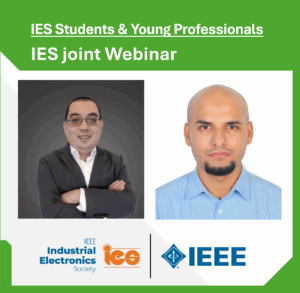[SYP Webinar] Neuro-symbolic AI: The Third Wave of AI
Thursday 26 September 2025 at 8:00 AM EDT, 10:00 PM AEST, 02:00 PM CEST
By Houbing Herbert Song and Safayat Bin Hakim (SONG Lab, University of Maryland Baltimore County, Maryland, USA)
Joint webinar with IES Young Professionals Committee
Register now using the link below:
https://attendee.gotowebinar.com/register/54851785895924309
Abstract:
There are three waves of Artificial Intelligence. The first Wave of AI is Crafted Knowledge, which includes rule-based AI systems. The second wave of AI is Statistical Learning, which includes machines becoming intelligent by using statistical methods. The third wave of AI is contextual adaptation. In the third wave, instead of learning from data, intelligent machines will understand and perceive the world on its own, and learn by understanding the world and reason with it. Neuro-symbolic AI, which combines neural networks with symbolic representations, has emerged as a promising solution of the third wave of AI. In this talk, first Houbing Herbert Song will share his journey from counter-unmanned aircraft systems to explainable AI to neuro-symbolic AI. Then he will present the past, present, and future of neuro-symbolic AI. Prof. Song will also share his perspective on the emerging area of neuro-symbolic AI.
Safayat Bin Hakim will focus on how Neuro-Symbolic (NeSy) AI moves from theory to real-world applications. He will explore the core limitations of current neural and symbolic approaches and show how their integration creates systems that are both adaptable and explainable. Practical case studies will be presented in cybersecurity, robotics, and intelligent agents, highlighting measurable improvements in performance and trust. The session will also introduce integration patterns that make NeSy systems effective across different domains. Current challenges such as scalability, grounding, and evaluation will be addressed honestly as opportunities for further research. Finally, we will outline a forward-looking vision of how NeSy AI can enable trustworthy, human-centered intelligent systems. Participants will gain insights into how explainability and adaptability together can transform AI adoption in high-stakes domains. The talk will conclude with a discussion of future research directions and the collaborative effort needed to advance this field.
Presenters’ bio:
Houbing Herbert Song (F’23) received the Ph.D. degree in electrical engineering from the University of Virginia, Charlottesville, VA, in August 2012. He is currently a Professor and the Director of the Security and Optimization for Networked Globe Laboratory (SONG Lab, www.SONGLab.us), University of Maryland, Baltimore County (UMBC), Baltimore, MD. He has been the Founding Chair of Trustworthy Internet of Things (TRUST-IoT) Working Group within IEEE IoT Technical Community since 2024. He is currently the Co-Editor-in-Chief (Co-EiC) of IEEE Transactions on Industrial Informatics (2025-present). He serves as an Associate Editor for IEEE Transactions on Artificial Intelligence (TAI) (2023-present), IEEE Transactions on Intelligent Transportation Systems (2021-present), and IEEE Journal on Miniaturization for Air and Space Systems (J-MASS) (2020-present). He was an Associate Technical Editor for IEEE Communications Magazine (2017-2020) and an Associate Editor for IEEE Internet of Things Journal (2020-2024). He is the editor of 10+ books, the author of more than 100 articles and the inventor of two patents. His research interests include AI/machine learning/big data analytics, cyber-physical systems/internet of things, and cybersecurity and privacy. His research has been sponsored by federal agencies (including National Science Foundation, National Aeronautics and Space Administration, US Department of Transportation, and Federal Aviation Administration, among others) and industry. His research has been featured on popular news media outlets, including IEEE Spectrum, IEEE GlobalSpec’s Engineering360, IEEE Transmitter, insideBIGDATA, StateTech Magazine, Association for Uncrewed Vehicle Systems International (AUVSI), Security Magazine, CXOTech Magazine, Solutions Review, EdTech Magazine, PYMNTS, Fox News, U.S. News & World Report, The Washington Times, and New Atlas.
Safayat Bin Hakim is a Ph.D. student in Information Systems at the University of Maryland, Baltimore County, USA. He previously served as a Ph.D. Research Assistant in the Department of Computer Science at the State University of New York at Buffalo, where he received the Chair’s Fellowship. He also holds a joint M.Sc. in Embedded Computing Systems from KTH Royal Institute of Technology, Sweden, and the University of Turku, Finland, and has served as an Assistant Professor of Electrical Engineering at the Islamic University of Technology, Bangladesh.
Mr. Hakim has received several fellowships and awards, including the EIT Digital Fellowship, the Erasmus Mundus scholarship, and an NSF Travel Grant to present at NeSy 2025. His work has been recognized with Best Paper Awards at IEEE UIC 2025 and AII 2021. He serves as a reviewer for multiple IEEE Transactions and Elsevier Journals and has contributed to program committees such as ICCCN 2024. His current research focuses on advancing AI-driven cybersecurity through neuro-symbolic and causal AI methods.


